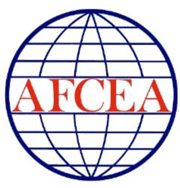AFCEA
 | |
| Predecessor | Army Signal Association |
|---|---|
| Formation | 1946 |
| Type | Non-profit |
| Website |
www |
The Armed Forces Communications and Electronics Association (AFCEA) established in 1946, is a non-profit membership association serving the military, government, industry, and academia as an ethical forum for advancing professional knowledge and relationships in the fields of communications, information technology, intelligence, and security. AFCEA supports local chapters, sponsors events, publishes SIGNAL Magazine, promotes education, and provides member benefits. AFCEA has more than 35,000 members.[1]
History
Following the American Civil War, the United States Veterans Signal Association was formed from the original Signal Corps established under Major Albert J. Myer of the U.S. Army.
This organization was active for many years, ultimately being augmented by veterans from the Spanish American War and World War I. Another World War I group, the American Signal Corps Association, merged with the U.S. Veterans Signal Association in 1918 and was active until 1944 (World War II).
In May 1946, Major General Harry C. Ingles, Brigadier General David Sarnoff, and a number of industrial leaders joined to found the Army Signal Association, absorbing the remaining chapters of its predecessors.
In 1947, with the unification of the services, the name was changed to Armed Forces Communications Association, and in 1954 the name evolved as the Armed Forces Communications and Electronics Association. In 1979 AFCEA became international with the establishment of chapters in Europe, Asia and Canada.
SIGNAL Magazine
SIGNAL is a monthly international news magazine targeting government, military and industry professionals active in the information technology and intelligence fields. Among the topics covered in the magazine are command, control, communications, computers, intelligence, surveillance and reconnaissance (C4ISR); information security; research and development; electronics; and homeland security.
Online publications
A monthly online newsletter, SIGNAL Connections, is emailed mid-month to members. AFCEA’s online directories include a source book, the cybersecurity directory and the health IT directory. Organizations provide the information in these online publications, including contacts, business focus, products/services, and/or clients. AFCEA is involved in technologies including webinars, podcasts, blogs, and RSS Feeds. AFCEA has a presence in social media platforms including LinkedIn, Facebook, Second Life, Twitter, GovLoop, MySpace, YouTube and del.icio.us.[2]
Foundation
The association, in partnership with the AFCEA Educational Foundation, chapters and members, presents $2 million annually in scholarships, grants and awards in six categories: 1) college students with science, technology, engineering and mathematics (STEM) majors, 2) current and future teachers of STEM subjects in U.S. middle and high schools, 3) underserved/minority college students studying STEM fields, 4) students in fields related to security such as intelligence, cyber and homeland security, 5) ROTC cadets/midshipmen and military personnel, and 6) students attending the five service academies and other military educational institutions.[2]
Professional Development Center
AFCEA’s Professional Development Center (PDC) is operated by the Educational Foundation and complements the Association's educational efforts by providing a wide-ranging program of continuing education, leadership development, and technical training courses.[2]
Chapters
AFCEA has 130 chapters and sub-chapters around the world to provide professional education and networking. Most hold monthly meetings to exchange ideas about communications, intelligence, imaging and information systems technologies. Nearly one-half of AFCEA’s chapters conduct symposia and seminars in addition to other chapter activities.[2] Individual chapters provide college scholarships, fund classroom equipment and mentor students in science fairs and technology clubs.[3][4][5]
Conferences
AFCEA conferences offer problem-solving opportunities to C4ISR, intelligence, homeland security and information technology professionals through exhibits, technical panels and speakers. Events include:[2]
- West Conference and Exposition, February, San Diego, California
- TechNet Asia-Pacific Conference and Exposition, October/November, Honolulu, Hawaii
- Intelligence Symposia, Washington, D.C.
- TechNet Conference and Expositions, October, various European locations
- Chapter meetings, technical panels and symposia, various locations
References
- ↑ AFCEA International website
- ↑ 2.0 2.1 2.2 2.3 2.4 "AFCEA International (Armed Forces Communications and Electronics Association)". Web site. Retrieved September 30, 2013.
- ↑ http://www.afcea.org/education/scholarships/undergraduate/ChapterScholarships.asp
- ↑ http://www.afcea.org/education/scholarships/chapters/teachingtools.asp
- ↑ http://www.afcea.org/membership/StudentHome.htm